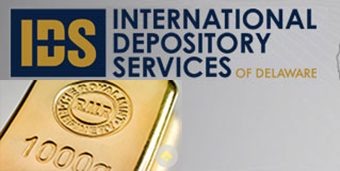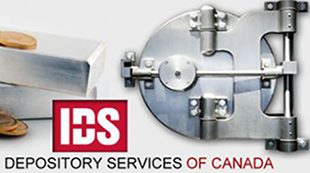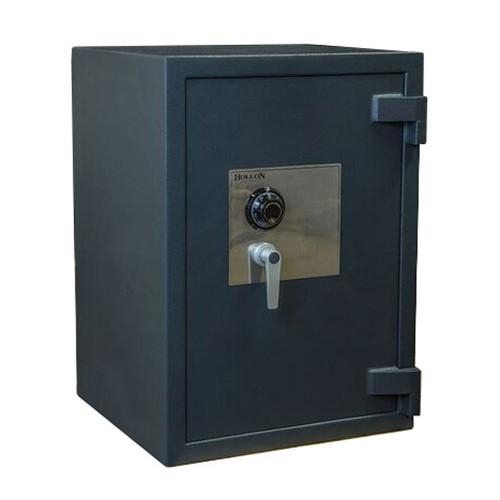Precious Metals Storage Options
There is no one size fits all storage solution for precious metals investors. Here we have outlined the multiple options for precious metals storage that any investor can choose from. They all have pros and cons, so read through and feel free to call us to discuss your personal situation and the optimum precious metals storage solution for you.
Insured Depository (Vault) Storage
Depository storage is an alternative that allows you both privacy, as well as different geographic locations for storing your metals. There are advantages to utilizing depositories to store metals (and they are required for IRA allocations), but the depository you select should meet some stringent criteria. At the end of the day you still have to trust a third party to honor the agreement and protect your precious metals.
Allocated vs. Unallocated
- There are two ways metals can be stored at depositories, allocated or unallocated. Many depositories store and hold the metals in allocated accounts, meaning the actual precious metals that were shipped are being held in a separate area, similar to a safety deposit box. At point of distribution, the exact same precious metal that was originally deposited will be shipped out of the facility.
- Unallocated storage is also an option where the metals are co-mingled with other metals based on the size/weight and refinery of coins and minted year. At point of distribution, the metal will be the identical size/weight, refinery or same year coins that will be shipped out, but not necessarily the exact metal you purchased. We do NOT recommend unallocated storage to any of our clients!
Fees
- Fees vary by depository and it is important to do due diligence before selecting your depository. From a budget standpoint, investors should remember that depository fees need to be paid annually. We have assessed the fee structure of the various depositories and make our recommendations accordingly. Note: For IRA clients, please remember that your annual depository fees must be paid from your IRA funds – they may not be paid personally.
Fisher Precious Metals is pleased to offer independent storage for precious metals and rare coins. All coins and bars are stored with third-party depositories that are neither owned nor affiliated with Fisher Precious Metals. All precious metals in the storage program are insured by the depositories.
Our Storage Program is particularly popular with investors and collectors who want the benefits of owning precious metals and rare coins but don’t want the burdens associated with storing these items themselves. Bullion investors can also acquire bulk precious metals such as gold and silver near the spot price of the specified metal plus a nominal commission fee – conversion fees apply for clients who later seek delivery.
The depositories we work with and recommend are located in: Delaware, Toronto, and Grand Cayman. All of them provide our clients with allocated storage for market competitive fees.
Depository Partners
IDS Delaware | IDS Canada – Toronto | |
| IDS’s highly-secure facilities are state-of-the-art and equipped with UL-rated, multi-redundant security systems monitored in real-time, 24/7 by off-site security specialists. One of the great things about IDS is that all of your assets are held in “custody”, in other words, they are stored in client-specific accounts, off of IDS’s balance sheet. | IDS of Canada is North America’s newest and most technologically advanced precious metals depository. Strategically located in Canada’s business capital, with headquarters in the Greater Toronto area, it is Canada’s first full-service LBMA and IIROC-approved precious metals depository. | Strategic Wealth Preservation is a new purpose-built precious metals storage facility with fully allocated, segregated and insured secure storage located in the Cayman Islands. Independently owned and privately operated, clients retain direct and complete legal ownership of their precious metal holdings while they are in the facility. |
 |  |  |
Although storing precious metals at home provides instant access, securing large quantities of precious metals in storage facilities frees up space and reduces risk of theft and loss from your home.
Storage at Home
Fisher Precious Metals will be happy to advise you as to how to safely store your metals at home. The homes of other trustworthy family members also present a viable storage opportunity. There are a number of different strategies to keep your metals safe from thieves on your own property. “Hiding” is particularly attractive for smaller quantities. Stop and ask yourself, “If I were a thief, where would I not look?” There are dozens of places in your home where no one would think to look. If we list them here then the “wrong eyes” might see them.
One disadvantage of this method is the risk of fire. But, even melted gold or silver are worth approximately 95% of the market price to a refiner. The only other risk is forgetting where you have hidden your silver or gold.
Our first tip is to make sure that no one knows you store metals in your home or that of your family members. The less said the better.
Call us to discuss the “Where” and “How” details of home storage.
Note: Do NOT attempt to store IRA Precious Metals at home. Please take time to read our article “Beware of Home Storage IRAs”.
Safes
 A quality safe! A Sentry brand-type safe from Office Depot, Home Depot or Walmart is NOT a safe. They are a lockable fire box and nothing more. They instill a false sense of security. Even if you bolt it down, the safe can be opened with a drill, electric saw or sledge hammer in less than one minute. Two men can pick it up with no problem. If nothing else, this type of safe is most valuable as a decoy safe.
A quality safe! A Sentry brand-type safe from Office Depot, Home Depot or Walmart is NOT a safe. They are a lockable fire box and nothing more. They instill a false sense of security. Even if you bolt it down, the safe can be opened with a drill, electric saw or sledge hammer in less than one minute. Two men can pick it up with no problem. If nothing else, this type of safe is most valuable as a decoy safe.
We also do not recommend gun safes – although they look larger and sturdier, they are not. Thieves don’t even bother with the combination locks on these safes. Thieves use a circular saw with a carbide blade to cut a hole in the side or top of a typical gun safe, again in less than a minute. The size and weight alone of a gun safe are not an effective deterrent. It takes less than 30 seconds to take the top off of one of these safes.
If you have $50,000 in metals or more, or you are unwilling to take a chance on theft no matter the amount, you need to invest in an Underwriters Laboratory (UL) listed safe of Class “TL-15” or higher. “TL” stands for “Tool Resistant” and “15” is the minimum number of minutes a professional safe technician with all the proper tools would need to penetrate the safe. This rating is a minimum. You should plan on spending $1,500 or more. Please contact us if you would like to discuss safes further. We consider client education on storage a very important part of our firm’s service commitment and we receive no compensation from the sale of safes.
Visit a reputable safe retailer. Plan on spending a minimum of $1,000 and allot approximately 1-2% of the value of your holdings to a safe. We would be happy to provide referrals.
Bury It
Seriously – this is a very real option. You don’t have to worry about losing your gold and silver to a burglar or having it damaged in a fire. Just don’t lose your memory!
If you decide to go this route, use a container that is airtight and waterproof. You can use common PVC pipe with end caps sealed with glue. Place the coins in baggies. Add a small amount of silica gel in the pipe to absorb any residual moisture. Bury the PCV in a hole with a small amount of cement. PVC will last for decades underground. We can also recommend a couple of capsules manufactured specifically for this purpose.
Where do you bury it? Your location should be neither too easy nor too difficult to find. Not too easy, so that the gold won’t be found by a thief, but not so difficult that, years later, you or your heirs have trouble locating it. Find a place, on property you own, that you’ll remember, but that isn’t obvious if someone learns you’ve buried something valuable.
Safety Deposit Boxes
Unlike all of your other financial assets, your physical metals have no Social Security or Tax Identification Number attached to them. Once you put your metals in a bank box, they come under the umbrella of your contractual relationship with the bank (and by extension, the government). Should you ever become embroiled in litigation, a seizure, or worst of all a bank holiday, your metals will have been compromised. In addition, The US Department of Homeland Security has the full authority to inspect safety deposit boxes without a warrant and seize any/all of the contents – specifically gold. A safety deposit box should be your LAST resort for storing precious metals.
Finally, your hours of access are restricted, the contents are not insured and your privacy is reduced. Granted, safe deposit boxes are easy. But why subject yourself to these liabilities?
Secret
However you choose to store your metals, inform two people as to the details. They need to be individuals whom you completely trust and who are tight lipped. They will need to gain access to your items if you become incapacitated or die. Write down the locations and details in such a way that no one other than those closest to you would be able to decipher the instructions.